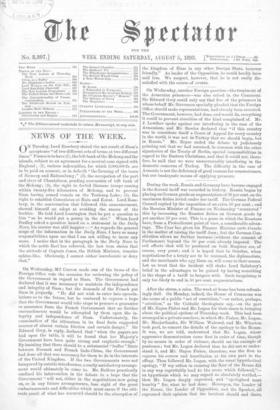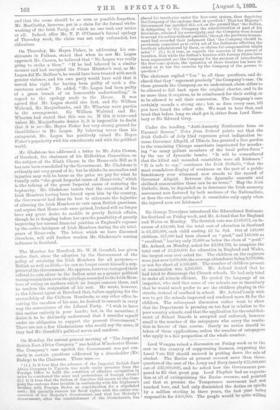After the storm, a calm. The week at home has
been refresh- ingly dull. On Monday, indeed, the House of Commons was the scene of a public "act of contrition,"—or rather, perhaps, " attrition," as the Catholic theologians say,—on the part of Mr. Hayes Fisher and Mr. Logan for their share in bringing about the political cyclone of Thursday-week. This had been arranged in a private conclave, in which Mr. Fisher, Mr. Logan, Mr. Marjoribanks, Sir William Walrond, and Mr. Wharton took part, to concert the details of the apology to the House. It was, we are told, understood that Mr. Logan, whose aggressive demonstration came first in order of time, though by no means in order of violence, should set the example of penitence; but Mr. Logan declared that he did not so under- stand it, and Mr. Hayes Fisher, therefore, was the first to express his sorrow and humiliation at his own part in the affray. Then followed Mr. Logan, with the usual hypothetical apology, "If my action in crossing the floor of the House did in any way regrettably lead to the scene which followed,"— an hypothesis which we may regard as absolutely verified,— then Mr. Logan deeply regretted, and "apologised most humbly" for, what he had done. Hereupon, the Leader of the House, the Leader of Opposition, and the Speaker, all expressed their opinion that the incident should end there, and that the scene should be as soon as possible forgotten. Mr. MacCarthy, however, put in a claim for the formal white. washing of the Irish Party, of which no one took any notice at all. Indeed, after Mr. T. P. O'Connor's formal apology of Thursday week, the claim was not only unfounded, but ridiculous.



































